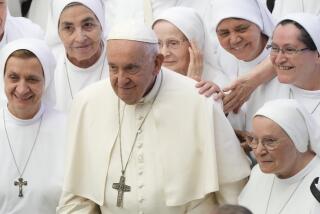Bishops’ Pastoral Is Plainly Political
America’s Roman Catholic bishops have issued their pastoral letter on the U.S. economy, replete with specifics on how to deal with unemployment, poverty and Third World development.
It suggests greater spending on job creation programs, low-income housing, day-care services, foreign aid and maintenance and repair of parks. It gives views on tax policy, Third World debts, family farms, the law of the sea and much more.
What is one to make of this astonishing document? The proposals made and views expressed are not astonishing. They are part of the common coinage of political debate. What is astonishing is that 300 Catholic bishops have embraced a detailed political program.
A Catholic believes that the Holy Spirit gives special graces to bishops, as successors of the apostles. But can this privilege be stretched to details of tax and welfare policy, economic development and the international banking system? The bishops have not only set themselves up as authorities on the techniques of achieving certain ends, but done it after a process that hardly differs from a secular, political exercise.
But is not the letter really intended to be a political document? Bishop James W. Malone, the now retired president of the National Catholic Bishops Conference, has in the past said as much. The aim of the bishops, he has asserted, was to influence the councils of government by debate and persuasion in the public arena on a broad spectrum of issues, while claiming no special status. And he added that no special status should be accorded.
There speaks not so much a bishop as a politician. And as if to confirm that this attitude is shared by the Bishops’ Conference, they have now allocated funds to promote the ideas and presumably the programs of the letter. One can almost guarantee a short life for the pastoral letter because it hangs precariously on selected ephemeral and controversial literature. But given the state of mind of the Bishops’ Conference and its staff, we may expect other similar political initiatives. The energizing element in politics is self-interest. Certainly rational and ethical factors play a part in the temporary balancing of interests. Every political interest is likely to be clothed in a moral dress. Every interest thinks it fair and just to pursue power to further that justice. Hence the passions, posturings, deceit, oversimplifications, demonstrations and slogans. And out of these maneuvers come--as might be expected--not solutions but temporary adjustments, accommodations, compromises. This is democracy, the best we can expect it. But it will endure so long as those who practice it are disciplined by moral habits and constitutional restraints.
Is it then the role of the church to compete in this turbulent forum, or is it rather to strengthen the moral and spiritual qualities necessary if our warring factions are not to destroy each other?
A prudent person will surely approach politics with fears, doubts and scruples: fears of the misuse of power, doubts about the merits of his goals and scruples as to the efficacy of the means one proposes to achieve them. One remembers the agonies of Lincoln in trying to discern the divine will of which so many others seemed to have received direct advice. Such considerations would suggest that bishops should exercise great prudence. They would suggest that they intervene only occasionally, certainly not on a broad spectrum of issues, and where the moral dimension is both clear and of great consequence.
We might all reflect on the conclusions, after lifetimes of study, of two distinguished Christian historians, one Catholic, one Methodist:
“The true social function of religion is not to busy oneself with economic or political programs, but to save civilization from itself by revealing to men the true end of life and the true nature of reality.”-- Christopher Dawson
“Those people work more wisely who seek to achieve good in their own small corner of the world, and then leave the leaven to leaven the whole lump, than those who are forever thinking that life is vain unless they can act through the central government, carry legislation, achieve political power and do big things.”-- Herbert Butterfield
Will the bishops be open to such advice? The social and intellectual climate make it highly unlikely. But the bishops are men of their times. In coming to power and influence in American society they, like any other leading group, look for salvation through political action. The issue of the separation of church and state is now marginal. It is fading away. Despite an occasional flurry, the church is comfortable in the political scene. And, like any other player, their interventions are welcomed or deplored according to their usefulness to the protagonists.
Catholics are becoming less and less distinguishable socially and politically. It is a part of the long and now rapid process of the secularization of the West. And the bishops themselves may unwittingly be contributing to the process.
More to Read
Sign up for Essential California
The most important California stories and recommendations in your inbox every morning.
You may occasionally receive promotional content from the Los Angeles Times.










